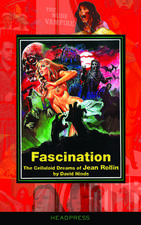Surveillance and Terror in Post-9/11 British and American Television
Autor Darcie Rives-Easten Limba Engleză Hardback – 29 iul 2019
| Toate formatele și edițiile | Preț | Express |
|---|---|---|
| Paperback (1) | 384.31 lei 43-57 zile | |
| Springer International Publishing – 14 aug 2020 | 384.31 lei 43-57 zile | |
| Hardback (1) | 501.39 lei 43-57 zile | |
| Springer International Publishing – 29 iul 2019 | 501.39 lei 43-57 zile |
Preț: 501.39 lei
Preț vechi: 589.87 lei
-15% Nou
Puncte Express: 752
Preț estimativ în valută:
95.97€ • 104.28$ • 80.67£
95.97€ • 104.28$ • 80.67£
Carte tipărită la comandă
Livrare economică 21 aprilie-05 mai
Preluare comenzi: 021 569.72.76
Specificații
ISBN-13: 9783030168995
ISBN-10: 3030168999
Pagini: 287
Ilustrații: VII, 262 p.
Dimensiuni: 148 x 210 mm
Greutate: 0.48 kg
Ediția:1st ed. 2019
Editura: Springer International Publishing
Colecția Palgrave Macmillan
Locul publicării:Cham, Switzerland
ISBN-10: 3030168999
Pagini: 287
Ilustrații: VII, 262 p.
Dimensiuni: 148 x 210 mm
Greutate: 0.48 kg
Ediția:1st ed. 2019
Editura: Springer International Publishing
Colecția Palgrave Macmillan
Locul publicării:Cham, Switzerland
Cuprins
1. Introduction: Surveillance and Terror in Post-9/11 British and American Television.- 2. Captive Viewers: Prisons, Captivity, and Social Control.- 3. Policing, Surveillance, and Terror—and the Return of Sherlock Holmes.- 4. We Spy: Espionage and the National Intelligence Agency.- 5. Conclusion: The Double Conditioning of Viewers, Surveillance, and Television.
Recenzii
“This book makes a critically important contribution in its discussion of the emergence of a new kind of 'voyeurism' which positions the Other´s suffering as a form of cultural entertainment for a global spectator.” (Maximiliano E Korstanje, Critical Studies on Terrorism, November 29, 2019)
Notă biografică
Darcie Rives-East is Associate Professor of English at Augustana University, South Dakota, USA. She has most recently published in The Journal of Popular Culture; Left in the West: Literature, Culture, and Progressive Politics in the American West and Interpretation: Theory: History.
Textul de pe ultima copertă
This interdisciplinary study examines how state surveillance has preoccupied British and American television series in the twenty years since 9/11. Surveillance and Terror in Post-9/11 British and American Television illuminates how the U.S. and U.K., bound by an historical, cultural, and television partnership, have broadcast numerous programs centred on three state surveillance apparatuses tasked with protecting us from terrorism and criminal activity: the prison, the police, and the national intelligence agency. Drawing from a range of case studies, such as Sherlock, Orange is the New Black and The Night Manager, this book discusses how television allows viewers, writers, and producers to articulate fears about an increased erosion of privacy and civil liberties following 9/11, while simultaneously expressing a desire for a preventative mechanism that can stop such events occurring in the future. However, these concerns and desires are not new; encompassing surveillance narratives both past and present, this book demonstrates how television today builds on earlier narratives about panoptic power to construct our present understanding of government surveillance.
Caracteristici
Offers an accessible study that analyses the interconnection between surveillance, government, and popular culture Argues that our present cultural landscape is not new terrain, but rather an intensification of established literary narratives, historical transatlantic connections, and practices of the state Draws on television studies, cultural studies, surveillance studies, critical theory, history, and literature























